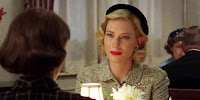 |
| Carol |
Perhaps getting ahead of myself. I headed into this preview screening at the BFI full of trepidation. Would Todd Haynes mess it up, overstylising his adaptation of Patricia Highsmith's 1950s lesbian-themed novel, lavish on his box of cinematic tricks and miss the wood for the trees? Thankfully, No. Haynes hits it out of the park, as we used to say, back in the old neighbourhood. That neighbourhood was slightly north of Manhattan, seen here in all its sepia-toned loveliness, a time when men wore hats and women like Cate Blanchett's Carol wore gloves. And what gloves! Those gloves, so artlessly left on the counter of Therese's (Rooney Mara) department store counter, prove so alluring that she sweeps them up, takes them home and eventually posts them to their owner who promptly reciprocates by phoning her on the shop floor and inviting her to lunch. As you do. And so it begins.
Their romance, teased out through home visits, car journeys to New Jersey and eventually a rather unexpected road trip to Chicago (!) brings the older, wealthier Carol into the orbit of the younger, breathlessly naive Therese, so green she doesn't know how to order at a restaurant, much less define her sexual identity. Blanchett's indefatigable tranche of meaningful looks, hair tosses and the occasional pat on the shoulder is a delight to watch. One envies Therese, for how can she resist?
Despite having read the book many years ago, I didn't recall many plot details and agonised over how the story would play out, as Carol is put through the wringer by her soon-to-be-ex-husband, who is keen to punish her for leaving him and uses their daughter as payback. Carol and Therese's relationship alters as the balance of power shifts, and it is also a lovely touch to see that Carol has an ex-lover who remains a loyal friend, so rare in mainstream films that isolate lesbian relationships. I was enthralled, my one gripe being the sex scenes seemed a bit porny, as seen through a male lens. Generally, though, the tone of the film is just right, not so in thrall to period detail that it forgets the characters or their very powerful emotions.
No comments:
Post a Comment